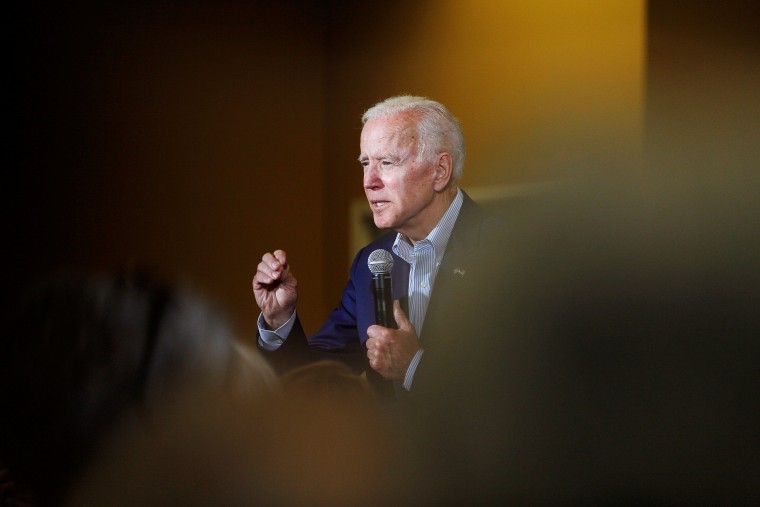The past is a double-edged sword for Joe Biden.
On one side, it's been the main selling point in the early days of his campaign. He's cast himself as a steady, experienced hand who can right the ship of state after a tumultuous period with President Donald Trump at the helm.
To endear himself to fellow Democrats, he's so often used the phrase "Obama-Biden" to remind them of his two terms as President Barack Obama's vice president that a newcomer to the political scene might be forgiven for thinking his first name is "Obama," not "Joe." During a trip to Iowa this week, he told voters that he'd been absent from an event over the weekend because he was spending time with the Obama family. A few days ago, he posted a throwback photo on Twitter of friendship bracelets bearing the names "Barack" and "Joe."
That blade of the past — sharpened with nostalgia and name recognition — helped Biden swiftly cut through the crowded Democratic field as soon as he launched his campaign in April.
But on the reverse edge, Biden's long record, including six terms in the Senate, have left him highly vulnerable to rivals claiming that he doesn't represent the future of the party or the country. He is well aware of the perils of his paradox: needing to present as a candidate of the future while taking advantage of his connection to the still-popular Obama and the experience that sets him apart from the rest of the pack.
At a closed-door fundraiser in Chicago on Wednesday night, Biden told donors that he doesn't want to get pinned down talking about votes he cast in the Senate as far back as the 1970s.
"This is not about the past," he said. "It's about the future, and what are we going to do? What are we going to do? How do we move this country forward? And it's all within our wheelhouse to do these things. There's not a single thing we cannot do."
Those comments, though, came right after he had spoken about Obama, about how his granddaughter had grown up with Obama's daughters, and how "this was a president that everybody could look up to."
For some of Biden's rivals — particularly the younger ones — his candidacy represents a misguided attempt at time travel. Just this week, South Bend, Indiana, Mayor Pete Buttigieg, 37, and former Texas Rep. Beto O'Rourke, 46, have, in increasingly aggressive terms, cast Biden as the driver who gets into the DeLorean from "Back to the Future" and plugs in the wrong date.
"You cannot go back to the end of the Obama administration and think that's good enough," O'Rourke said in an interview on MSNBC's "Morning Joe" on Thursday. "That cannot be who we are going forward. We've got to be bigger; we've got to be bolder."
Specifically, O'Rourke went after Biden on his vote for the Iraq War and more recently playing down the threat China poses to the United States — even though Biden quickly repositioned, saying he takes the latter seriously. (Biden said on "Meet the Press" many years ago that his Iraq War vote was "a mistake.")
Earlier this week, Buttigieg, an Afghanistan War veteran, suggested that Trump and Biden both have foreign policy views that are antiquated.
"Faced with this moment of great challenge and possibility, it’s not enough just to say we won’t conduct foreign policy by tweet," Buttigieg said at Indiana University in Bloomington. "Nor would it be honest to promise that we can restore an old order that cannot, in any case, meet the realities of a new moment. Democrats can no more turn the clock back to the 1990s than Republicans can return us to the 1950s."
The challenge for Biden, who has begun to roll out a series of policy proposals, will be to drive a narrative about his plans for the future in the midst of a campaign rooted in reminding Democratic voters — particularly voters in minority communities that felt recognized by Obama and threatened by Trump — of parts of his past. And to do all of that while cordoning off portions of his record he'd rather not discuss.
Last week, after months of deflecting hits on past positions, Biden took one. He announced that he no longer supports limits on federal funding for abortion — a change in a position he'd held for 40 years that came under pressure from abortion-rights groups and fellow Democratic candidates. It also came one day after his campaign had said he still favored the Hyde Amendment, which bans federal subsidization of abortion except in cases of rape, incest or when the life of the expectant mother is in danger.
Rep. Seth Moulton, D-Mass., a veteran who is seeking the Democratic nomination, tweeted his approval of Biden's new position, ending his message with "now do the Iraq War."
Matt Corridoni, a spokesman for Moulton, said that he's heard two main themes from Democratic voters on the campaign trail.
"They want to beat Donald Trump, but they also want something new," Corridoni said. "I think that's why you see Seth, Beto and Pete making this generational argument."
Biden is finding out that William Faulkner's observation applies to presidential politics: The past is never dead; it's not even past.
To win, he may have to figure out how to get past his past.

